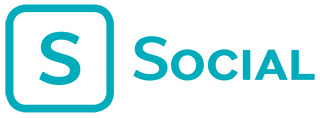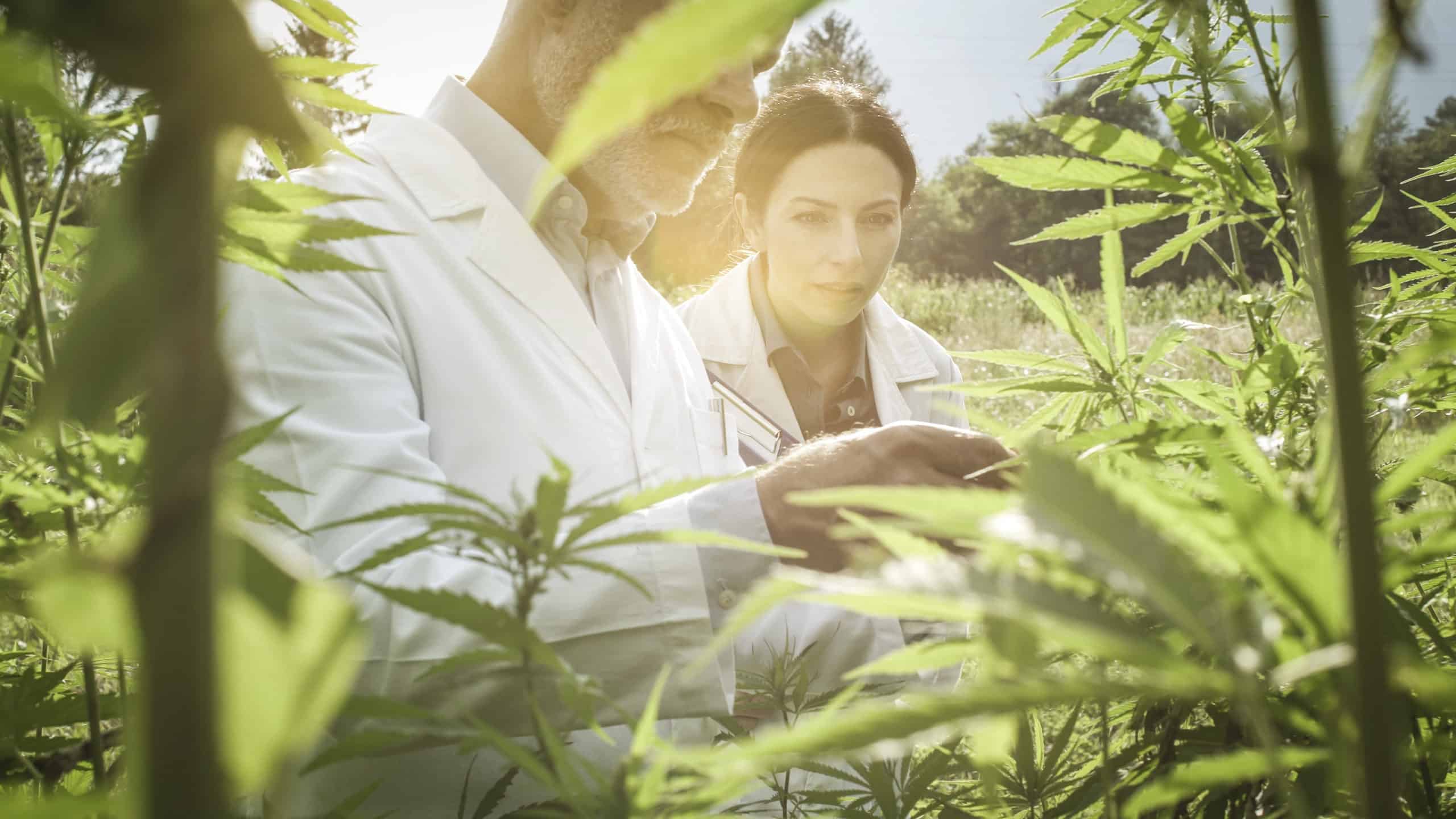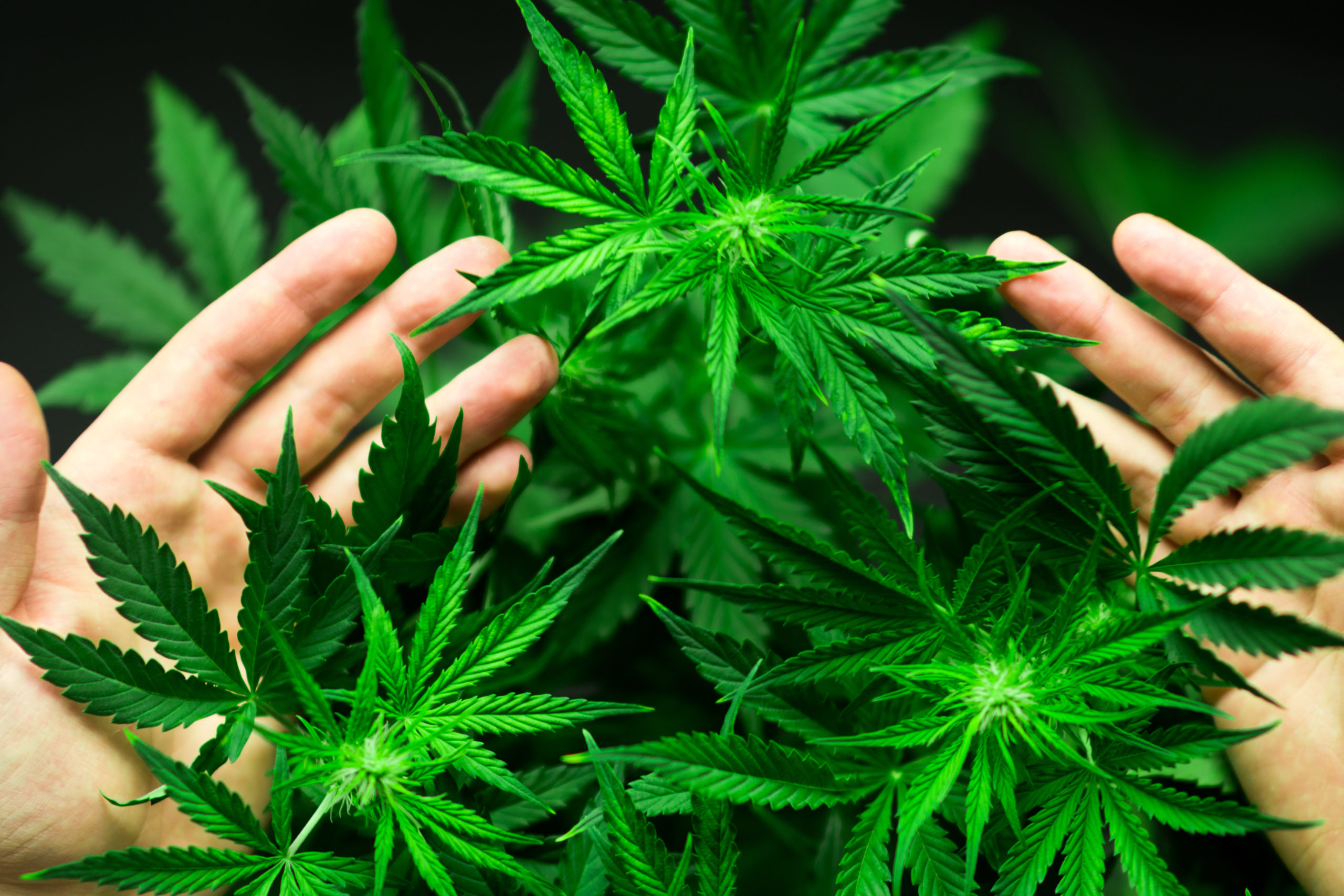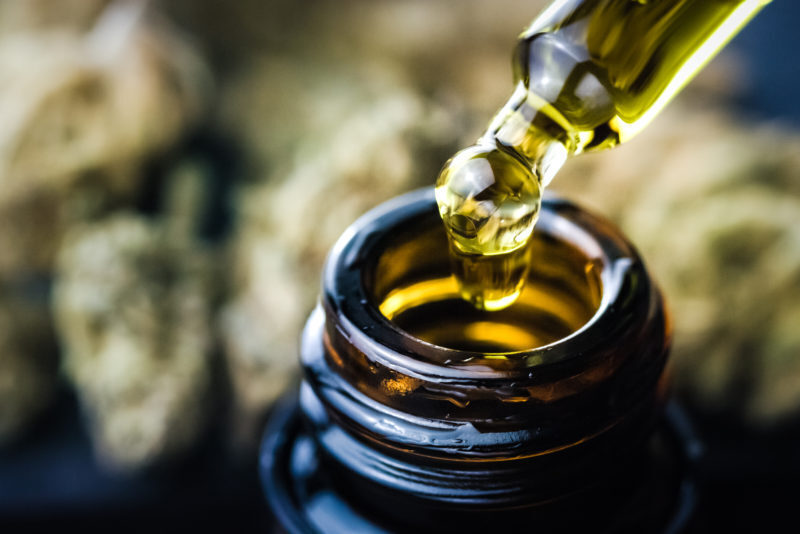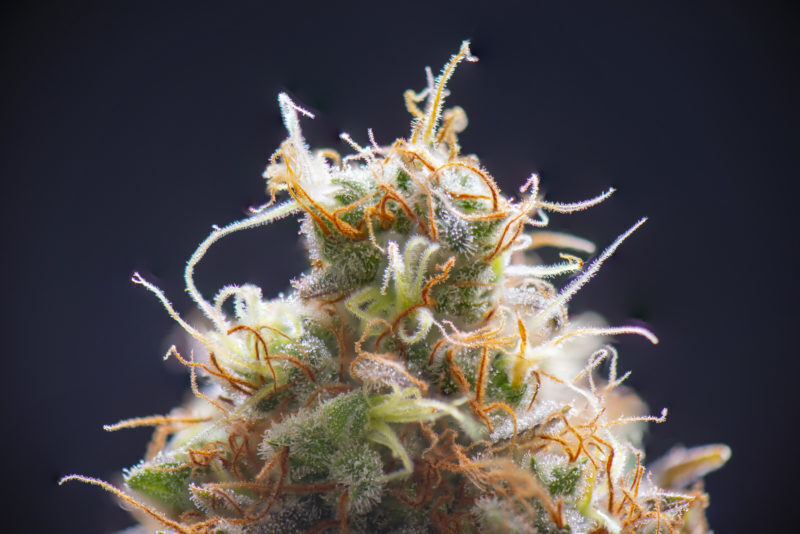-
- Market Research
- |
- CBD Near Me
- |
- Giveaways
- |
- Newsletter
- |
- Contact
- |
- Advertise
- |
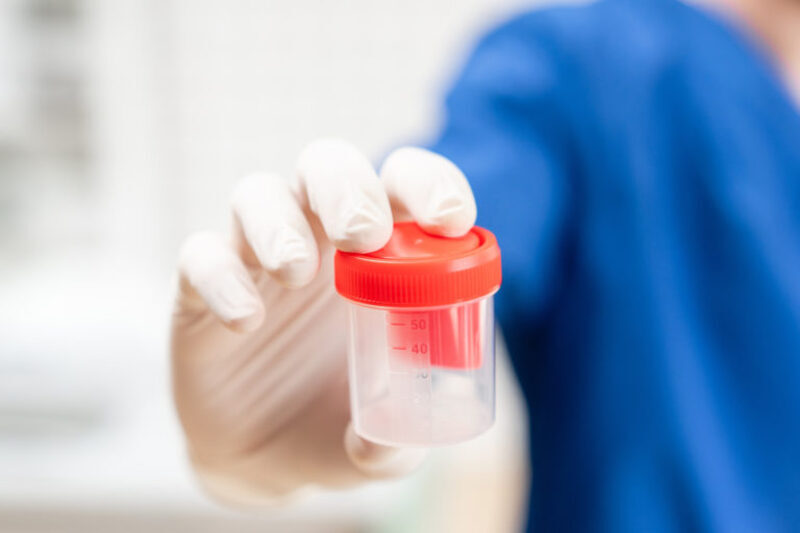
Drug test providers and employers couldn’t care less if you choose to consume CBD (with very few exceptions).
It’s that boisterous tagalong, THC, that could potentially land you in trouble.
The best course of action for CBD consumers looking to pass a workplace drug test would be to seek out ways to distance these cannabis-derived compounds known as cannabinoids from each other, not to stop taking CBD altogether.
It’s not in the interest of being difficult that we say this, but under differing circumstances, the answer to whether or not CBD oil can show up on a drug test is yes, no, and maybe.
Once you understand how you can affect THC concentration and lifespan in your system in various ways, you’ll have a much clearer understanding of where the line is so you can make sure not to cross it.
Does CBD Show Up on a Drug Test?
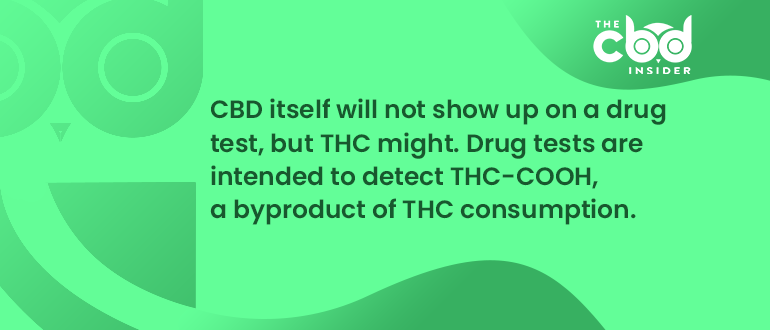
Cannabidiol itself won’t flag a drug test, but a telltale byproduct of accompanying THC just might under certain conditions.
First, it’s important to understand how marijuana drug tests work because this will provide you with multiple key insights that can inform smarter decisions when it comes to your CBD consumption.
This article by Toxicology Associates of Denver, CO, entitled “Interpretation of Workplace Tests for Cannabinoids,” for example, explains how most THC tests test for an “inactive metabolite” of THC known as THC-COOH (11-nor-9-Carboxy-THC).
In other words, you are actually being tested for a byproduct of the breakdown of THC that is passed in your urine, which is one reason why the tests can detect the cannabinoid days or even weeks after your last use.
Also of note are the cutoff concentration values.
As regulated by the congressionally enacted Drugfree Workplace Act of 1988, the initial screening cutoff concentration of marijuana metabolites is 50 ng/mL. The confirmatory test cutoff concentration is 15 ng/mL per the legislation.
If you fall below 50 ng/mL on the initial screening or 15 ng/mL on the confirmatory test that follows, then the test is negative and you pass.
Exceed these levels, and you fail the test.
This means that you can have trace amounts of THC in your system and still pass, an allowance that harmonizes well with the federal government’s decision to allow up to 0.3% of THC in hemp products as of the 2018 Farm Bill.
The next logical questions are, “When does CBD show up on a drug test, and when does it not? How can I keep THC levels as low as possible without dropping my CBD supplement?”
The answer is very much a list, so let’s run through it on a point-by-point basis.
The CBD Drug Test Conundrum Explained
In most cases, first-time CBD users trying to decide between an isolate, broad-spectrum, or full-spectrum product are usually more concerned about health benefits than drug tests.
However, if your workplace administers drug tests, the form of CBD you choose can determine which side of the cutoff line you land on.
Purity
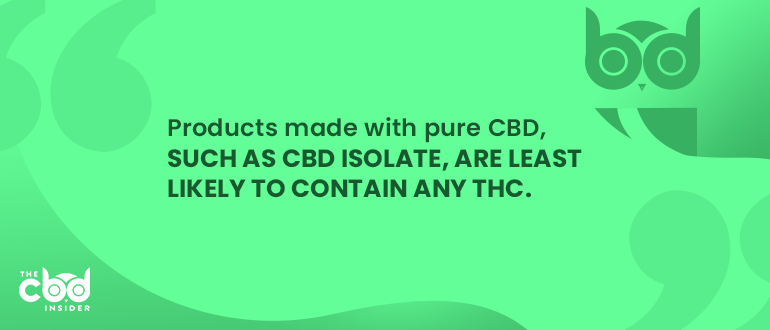
A Journal of Analytical Toxicology study by Johns Hopkins University and partnering research laboratories found that “acute dosing of pure CBD will not result in a positive urine drug test… however, CBD products that also contain ∆9-THC may produce positive urine results for ∆9-THCCOOH.”
They came to this conclusion after only one of the 218 urine samples they analyzed— provided from test participants who received “pure” or isolated CBD—tested positive for the above metabolite.
This stands to reason, since separating cannabidiol from all other cannabinoids and terpenes logically decreases your chance of consuming THC.
That’s why products made with pure CBD, such as CBD isolate, are least likely to contain any THC.
However, full-spectrum proponents need not despair yet, because it’s still difficult to fail a marijuana drug test with a full-spectrum product that is properly labeled and ethically produced, which brings us to our next point.
Labeling and Certification
Most seasoned shoppers are leary enough of professionally photographed images and strategically worded claims on everyday product labels to know that their experience with a product may differ, but CBD products are not quite established enough for that effect to take hold.
As with every other industry, there are those (CBD brands) who manufacture and label their products the right way, and unfortunately, those who cut corners.
Any brand that claims to have zero THC in any particular CBD product, for example, may be rounding down for marketing’s sake.
If you want to ensure that you’re receiving an accurately labeled product so you can keep your THC levels low enough to pass a drug test without question, the only way to do so is to consult the Certificate of Analysis provided to the brand by a third-party laboratory.
It’s much better to find a non-zero THC value backed by an established laboratory than to simply take the label’s “zero THC” claim at face value.
Cross-Contamination
If the brand that produces the CBD product you intend to buy also manufactures products containing higher proportions of THC, then the window for cross-contamination is open.
Unless the vendor can certify that their CBD and THC products are sourced, manufactured, packaged, and shipped without ever coming anywhere near each other, they can’t deny this possibility.
A simple internet search will usually tell you all you need to know about the different types of products a vendor offers, which is a wise practice for CBD consumers looking to minimize exposure to THC.
Quantity Consumed
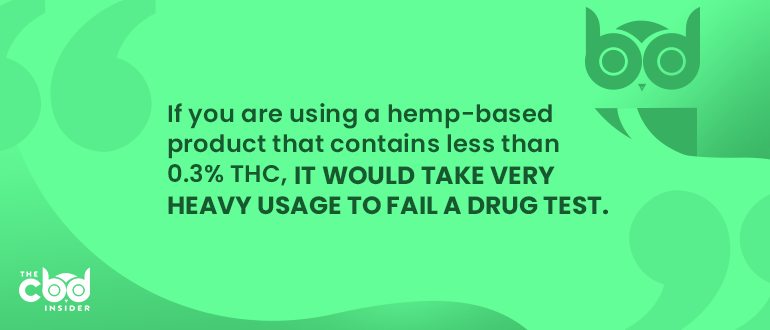
Even in the case of full-spectrum CBD, if you’re using a hemp-based (as opposed to a marijuana-based) product that abides by the federally mandated 0.3% THC limit, it would still take very heavy usage to fail a drug test.
To provide an imprecise analogy, non-alcoholic beer can technically contain up to 0.5% alcohol under US legal code, kind of like CBD and the THC limit.
If you’ve done everything else right (avoided cross-contamination, ensured the labeling is accurate, opted for higher purity, etc.) with your CBD product, then failing a drug test would be like getting drunk off near-beer in terms of how much you would have to consume.
Route of Administration
How you take CBD (i.e., orally, inhaled, topically, and so on) influences both the peak concentration and half-life of the CBD and other cannabinoids in your bloodstream.
According to an article by Baltimore’s National Institute on Drug Abuse, “Absorption is slower when cannabinoids are ingested (orally), with lower, more delayed peak THC concentrations. Dose, route of administration, vehicle, and physiological factors such as absorption and rates of metabolism and excretion can influence drug concentrations in circulation.”
If you are one of the many employees across the US who is subject to random drug tests, however, inhalation may still not be the best option.
It may be faster in terms of absorption and excretion, but if you’re tested in that smaller window of time, the plasma concentration of THC will likely be higher.
Fickle Physiology
Finally, as we just hinted above, the difficult part about gauging anyone’s response to a drug or any other bioactive compound is that we all have dozens of unique factors inherent to our life experiences, genetic makeup, and physiology that can affect how we break down and excrete substances.
For example, these are just a few of said factors that can affect how substances like CBD are metabolized:
- Age
- Weight
- Dietary habits
- Genetic makeup
- Past medical history and drug use
- Sleep patterns
This is why it’s so important to emphasize what’s referred to in the research world as “intra-rater reliability,” which is just a stuffy way of saying that you should use your own experience with a product, not “standardized” recommendations, as a baseline to assist in making future changes.
Of course, you won’t likely be performing urinalysis on yourself to prepare for a workplace drug test, but you can still use the results when you are eventually tested to guide your CBD consumption towards safer levels of THC using these tips.
Long Answer(s) Short
Here are the short answers to the most pressing questions.
Can you fail a drug test due to CBD?
Yes, but it’s unlikely.
Will CBD oil show up on a drug test?
If the drug test is sensitive enough, it may detect trace amounts of the THC metabolite in the CBD oil, not the CBD itself, to an extent that is most likely below the cutoff limits discussed above.
In other words, there’s no such thing as a “CBD oil drug test” under federal guidelines.
Speaking of, if you happen to fail a marijuana drug test because of your CBD product consumption, don’t panic—you have options.
What to Do if You Test Positive
Whether you’re a current employee or a prospective hire who has just failed a marijuana drug test, you have the right to discuss your situation with your employer and/or the physician reviewing the results (Medical Review Officer).
While there are drugs that have been identified as having the potential to elicit a false positive result, like the anti-nausea drug Dronabinol, if you’re taking non-prescription CBD, your recourse is unfortunately not as strong because you did actually ingest the THC—it’s not a false positive.
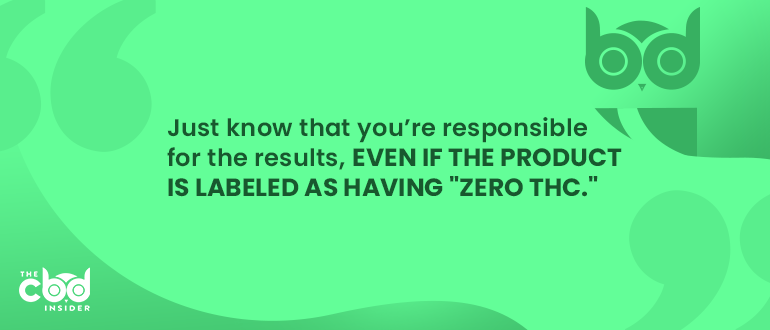
Still, providing your CBD product(s) to your employer and/or testing provider to review may help your case.
Just know that you’re responsible for the results, even if the product is labeled as having “zero THC,” which is why it’s so important to seek out honest and accurate labeling and reporting over sensational claims.
To prevent all this from happening in the first place, researching the best brands, checking that Certificate of Analysis, and keeping your consumption at a reasonable level can help you keep your THC levels consistently low.
Best THC-Free CBD Brands
Social CBD
Products Offered
- Broad-Spectrum CBD Oil
- Broad-Spectrum CBD Gummies
- Broad-Spectrum CBD Pet Products
- CBD Isolate Oil
- CBD Isolate Vape Pens
- CBD Isolate Gel Caps
- CBD Isolate Topicals
All products contain 0.0% THC*
Coupon Code
CBDINSIDER20: Get 20% off your entire order.
Learn More
To learn more, check out our Social CBD Review.
Medterra
Products Offered
- Broad-spectrum CBD oil
- CBD isolate oil
- CBD isolate supplements
- CBD isolate gummies
- CBD isolate immune boost drops
Coupon Code
INSIDER25: Get 25% off everything.
Learn More
To learn more, check out our Medterra review.


